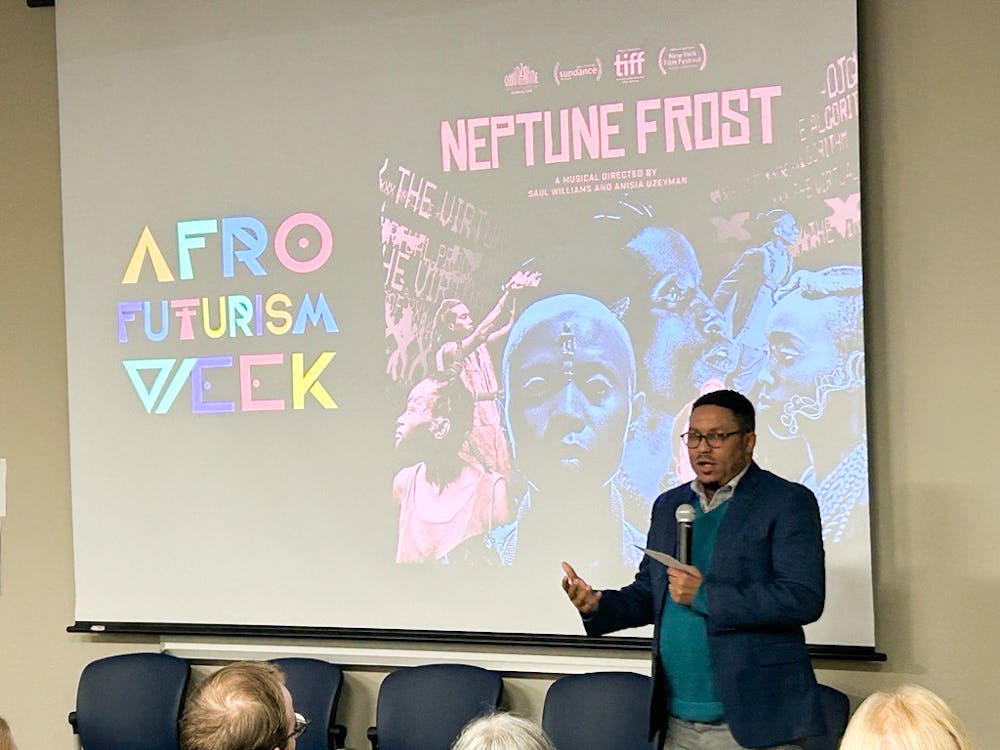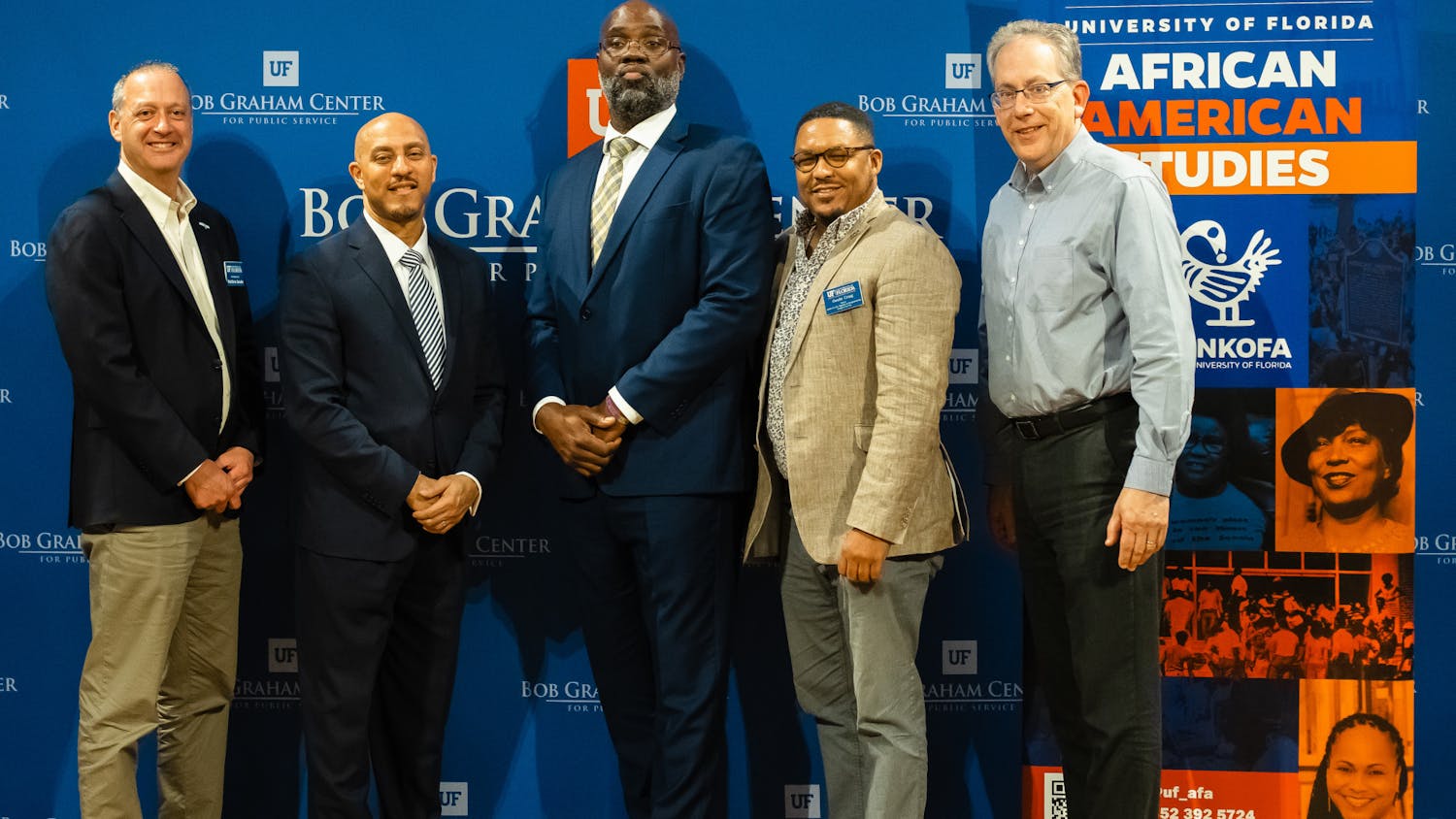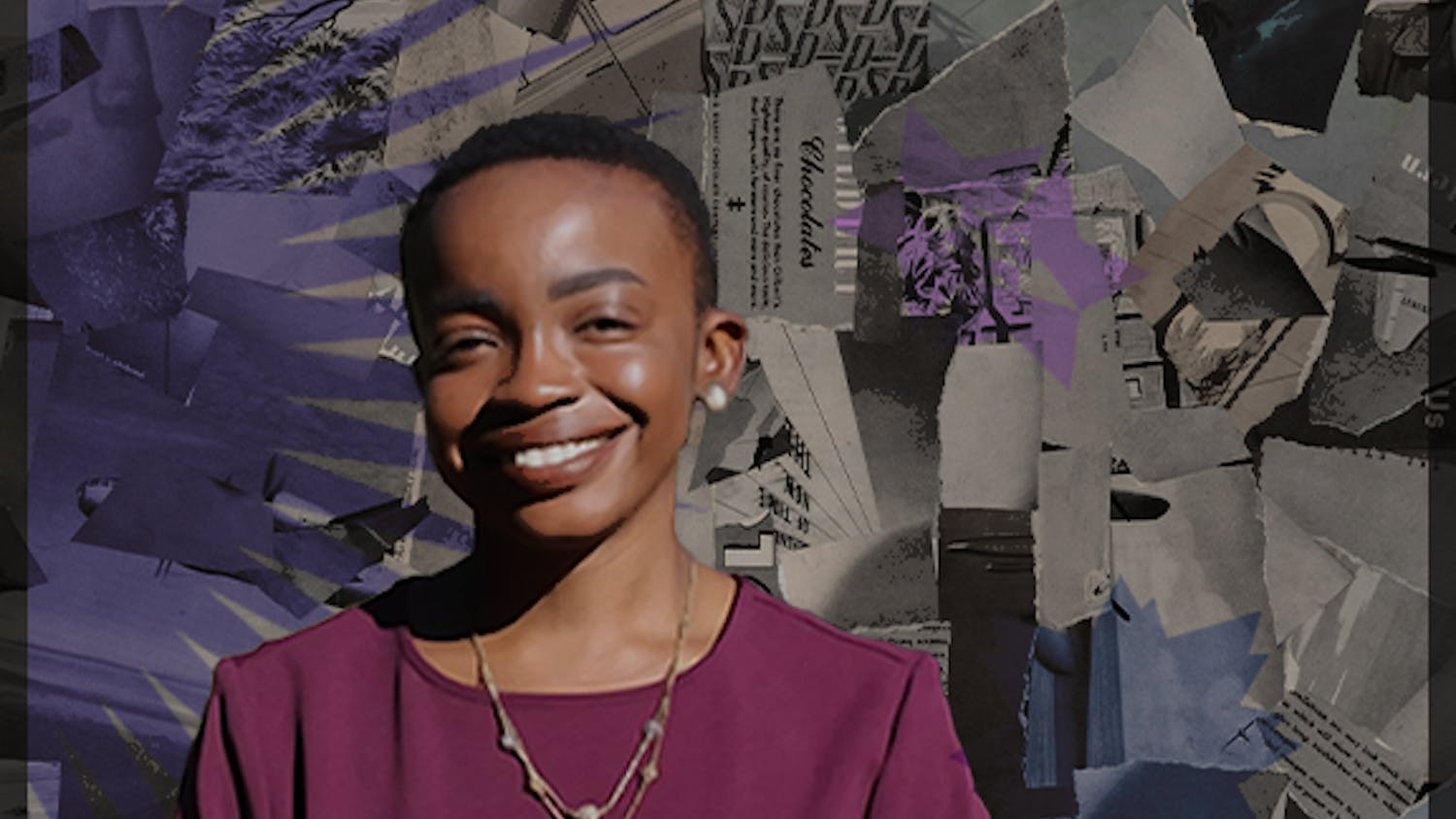The nine-day event features performances, art exhibitions about the Black diaspora
Amidst the echoes of musical performances and art exhibits, hundreds of people flocked to Gainesville museums, bars and theaters, eager to celebrate Black art and culture.
In honor of Afrofuturism week, the Center for Arts, Migration and Entrepreneurship and the School of Art and Art History invited audiences Jan. 17 for a nine-day celebration of Black diaspora expression.
The events were spearheaded by Porchia Moore, associate director at CAME, and Antoine Williams, UF assistant professor of drawing in the expanded field.
After brainstorming with teams from CAME and SAAH on how to memorialize the time between Martin Luther King Jr. Day and Black History Month, Moore and Williams organized Afrofuturism week to highlight Black voices and contributions to society.
Afrofuturism is a movement and cultural aesthetic that features futuristic and science fiction themes to explore the African American experience and connect those from the diaspora with their ancestry, according to the Tate Modern UK.
“Afrofuturism is a particular way of looking at the world that draws upon Black creative expression,” Moore said. “It is a tool to think about building other worlds but also serves as a tool to escape and build another reality.”
Natalia Guerrero, a 31-year-old UF master’s student, learned about Afrofuturism on her own. In the UF Master of Fine Arts program, Guerrero said she is excited to explore Afrofuturistic artistic representations over the week.
“This is something I want to learn more about,” she said. “The events that are going on this week in the arts, film, music and writing are going to spur a lot of ideas and boost creativity.”
History Dog and Casey Jones II
The celebrations began Jan. 17 with a musical performance by the NYC improvisational troupe History Dog and Casey Jones II, a 24-year-old Gainesville hip-hop rapper, at Baby J’s Bar.
History Dog is a newly formed electroacoustic improvisation band from New York, said vocalist Shara Lunon. The band's electronic music stems from jazz and other Black music traditions.
“We take traditions, our own histories and practices and use it to create something unique and … allow it to shape how future generations can take it and run with it,” she said.
Jones II began exploring music on his own and songwriting in 10th grade as he reveled in the work of rappers such as J. Cole and Tupac.
Jones II says his music deals with themes of Black American unity and identity.
“Right now we're all dealing with a lot of pain, and a lot of just instability and fear of where we are,” Jones II said. “Black people can identify with it almost the most because of where we've been positioned in society, but I think everybody can.”
“Neptune Frost” film screening
The performances continued with a film screening of “Neptune Frost” Jan. 18 at UF Innovate. The event was opened with an introduction to Afrofuturism by Dr. Porchia Moore, followed by a panel discussion.
The screening of Neptune Frost is part of CAME’s Migration in Film series, which celebrates the international experiences of migration.
Set in Burundi, the film follows a group of runaway coltan miners who form a computer hacker group. Moore said the film was chosen because it is a healthy critique of everyday realities and asks the audience to stand up to social injustices.
“It's one of these films that has so many references, literary and scholarly, but also is an important critique asking us to challenge our everyday realities and to shape change and meaning,” Moore said.
Mouray Hutchinson, a 21-year-old UF African American studies and computer science senior, loved the visuals and themes of the film. She related the film to the Afrofuturism class she is currently enrolled in.
“We were talking about the cyclical nature of Afrofuturism, and there is a quote in the movie where it talks about how Black bodies are floating between us, around us and in the Atlantic,” Hutchinson said. “[Afrofuturism] is the consistent acknowledgement of the present, future and the past.”
Veiled: Hooden and Hidden Art Exhibition
Afrofuturistic themes could also be seen Jan. 19 at Gainesville Fine Arts Association’s final night of “Veiled: Hooden and Hidden,” an exhibition that explores the erasure of Black history in public education and aims to share untold stories.
The four-day exhibition featured the work of 13 visual artists and included performances such as poems, speeches, dances and live music. The event also supported Black-owned businesses with vendors like Foundational Framework LLC, which sells jewelry and clothing handmade from the local people of Ghana.
Funded by the Reubin Askew research program of the Bob Graham Center for Public Service, the exhibition was curated by Anani Blakey, a 22-year-old UF graphic design senior. Her black-and-white photographs titled “Eclipse” were inspired by her own personal and community experiences, she said.
“There’s a lot of false narratives and hidden stories that we don’t normally see that are not depicted in society,” Blakey said. “It doesn’t really represent who we are as a community and our individual selves.”
Ashley Charley, a 21-year-old UF art senior, also aims to combat the stereotypes and pressures placed on Black artists.
Her work, “A Sacred Sensual Space,” was featured in the exhibition, and it discusses the limitations she felt growing up as a Black female artist, she said.
“In an art school, you're kinda forced to go in a certain direction, especially if you're a Black artist,” Charley said. “So, I wasn't really able to express my creativity to the fullest.”
UF master’s student Benedicta Opoku-Mensah was another participating artist. She said she created her work to express her frustration with the limitations placed on Black female artists in Africa.
Opoku-Mensah’s piece, “To Take On,” featured an imitation of her bedroom, with a desk covered in makeup, a clothing rack full of dresses and a screen cutting between videos of her putting on makeup and sculpting wood.
“In the video I'm trying to say that I don't really need to look masculine to take on a masculine task, I'm trying to break that stereotype in society,” she said.
Several pieces at the exhibit also worked to inform visitors of Black historical events the public education system often fails to teach.
Terry Harpold, a UF English professor, visited the exhibition in support of his former student, Jordan Bryant. Bryant’s three-piece painting, “M O V E,” explored the MOVE movement in Philadelphia, which was one of the most extreme cases of police brutality in American history, Harpold, who witnessed the bombing, said.
“[‘M O V E’] is driven by both grief and anguish over inequity in our culture but also the information itself and the declaration of resistance to grief and anguish,” Harpold said.
Upcoming events
On Jan. 23, Contemporary artist Wayne Hodge will guest lecture at 6:15 p.m. in Little Hall, Room No. 113. He will address his collage series, “Android/Negroid,” which includes collages of Surrealism and old science fiction illustrations while using historical portraits of African Americans.
The Harn Museum, at 3259 Hull Road, will be holding a celebration Jan. 25 from 6 to 9 p.m. Its celebration will include a Futurist fashion show, costume party, music by Quincy Osborne and a Surrealism exhibition.
Contact Molly Seghi at mseghi@alligator.org and Alexandra Burns at aburns@alligator.org. Follow them on X @molly_seghi and @alexaburnsuf.
Molly Seghi is a first-year journalism major at UF and a Fall 2023 Avenue Reporter. When not writing or journaling, she can be found at a live music event or working on her podcast “An Aural Account.”






